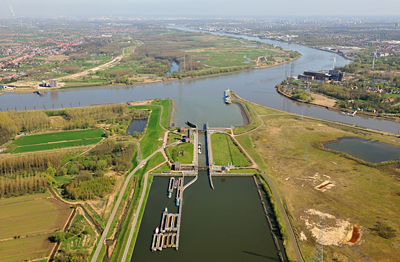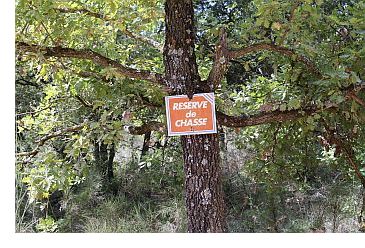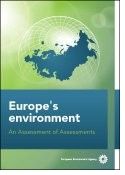News
SPIRAL "UK National Ecosystem Assessment" paper publshed
A new paper has been published based on work carried for SPIRAL, authored by Kerry Waylen and Juliette Young. This paper focuses on the first phase of the UK National Ecosystem Assessment.
Upcoming Event
No upcoming events.
News
Five strategies to help damaged marine ecosystems recover
Fri, 02/03/2012 - 20:27 — Koen Van Muylem
The largest investigation to date into the extent of human-induced pressure on European rivers concludes that around 80% of rivers are affected by water pollution, water removal for hydropower and irrigation, structural alterations and the impact of dams, with 12% suffering from impacts of all four.
There is no doubt that human activities have harmed marine environments. Well documented examples include the recent Gulf of Mexico oil spill, which caused significant damage to local ecosystems, and scientists regularly warn of the imminent collapse of European fish stocks.
Vancancy for a Biodiversity Science Policy Research Associate (Edinburgh)
Tue, 01/24/2012 - 14:59 — Koen Van MuylemSPIRAL are looking for an enthusiastic and committed scientist to work in an active interdisciplinary research team based at the NERC-CEH Edinburgh site. The focus of the role is on conducting interdisciplinary research in SPIRAL and two other EU FP7 research projects
These projects comprise small groups of natural and social scientists, many of which have extensive experience of working in interdisciplinary groups liaising with policy-makers, practitioners and civil societies.
Please open the attached PDF for more information.
Successful conservation policy needs monitoring and knowledge
Fri, 01/20/2012 - 16:24 — Koen Van MuylemNew research has explored how well different governance systems can achieve desirable conservation outcomes. Results confirmed the importance of adaptive management, which relies on regular monitoring to enable ‘learning through doing’ to refine actions, and suggested that leadership using expert knowledge was also significant in successful governance.
 With increasing policy concern about the degradation of ecosystems and loss of biodiversity, there have been a large number of different approaches to reduce the negative effects of human activity on nature.
With increasing policy concern about the degradation of ecosystems and loss of biodiversity, there have been a large number of different approaches to reduce the negative effects of human activity on nature.
What effect will the Water Framework Directive have on local planners?
Mon, 01/16/2012 - 15:15 — Koen Van MuylemFor successful implementation of the Water Framework Directive, local planners will need specific targets, guidance on interpretation, and adequate resources to monitor progress, according to a recent study from Sweden.
The research demonstrated that close collaboration between land use planners and water planners, and between officials working at a local and a regional level, is vitally important if the WFD is to be successfully managed. However, it also highlighted that the various groups involved in planning do not always agree on the impact of the WFD in their region.
To date, few researchers have looked at the effects of the WFD on the planners and institutions that will be implementing the directive locally. To address this, a team of Swedish researchers chose to study the Oxunda Catchment in Sweden. Traditionally, Sweden has allowed strong local management of water issues.
IPBES Assessment Survey
Sat, 01/14/2012 - 08:35 — Koen Van MuylemProf. Anantha Kumar Duraiappah, Prof. Harold Mooney and Prof. KazuhikoTakeuchi have initiated a survey in order to solicit scientists' feedback in the nascent stages of the establishment of IPBES.
The Japanese government has taken the initiative to support this global survey to gather feedback from the larger scientific community to inform the Second Session of the IPBES Plenary meeting to be held in April 2012. UNU-IHDP and UNU-ISP in collaboration with DIVERSITAS have been commissioned by the Ministry of the Environment of Japan to undertake this survey.
Free online database of environmental research for policy
Thu, 12/22/2011 - 11:31 — Koen Van MuylemScience for Environment Policy announces the launch of the Research Repository, an online bank of research results for evidence-based policy making.
The studies featured in the Repository have been carefully selected for policy relevance and quality, and include those that have appeared in the Science for Environment Policy News Alert.
The studies are finely categorised according to a wide range of policy themes and the resource is constantly evolving and expanding to accommodate new research.
Explore the Research Repository on Science for Environment Policy's website.
What influences our commitment to the evironment?
Tue, 12/13/2011 - 09:42 — Koen Van MuylemResearchers have used the psychological concept of ‘commitment’, normally used to understand relationships between people, to investigate our relationship with the environment. The results indicate that an individual’s commitment to the environment is important in their ecological behaviour, for example, their willingness to use public transport and make sacrifices for the environment.
Human behaviour is central to the exacerbation, mitigation and adaptation of various environmental issues, particularly climate change. As such, many policymakers are seeking insight into the psychological processes that influence pro-environmental behaviour, in order to inform policies that address detrimental behaviours and promote positive behaviours.
Results of exploratory workshop on use of instruments to influence behaviour
Mon, 11/21/2011 - 16:50 — Koen Van MuylemEarlier in 2011, SPIRAL held a workshop on science-policy interfaces (SPI), their use of instruments to influence behaviour, and the criteria by which they could be evaluated. This first workshop was primarily exploratory in nature, seeking to draw out some complex research issues relating to the ways in which SPIs can influence behaviour in more or less successful ways, and to ways in which these roles may be assessed.
Stakeholder involvement, clearly vital to the success of SPIs, is not a straightforward issue. If some groups are disengaged, others may consider the SPI as biased. On the other hand, increasing the number of participants in SPIs may reduce the efficient operation of the SPI. Providing motivations for diverse groups of stakeholders to participate may be challenging.
Assessment of Assessments demonstrates need for stronger links between science and policy
Mon, 11/07/2011 - 15:30 — Koen Van Muylem In support of the 2011 'Environment for Europe' Ministerial Conference in Astana, the European Environment Agency has recently produced a report entitled ‘Europe’s Environment – An Assessment of Assessments’. This report focuses on the themes of water and water-related ecosystems, and greening the economy.
In support of the 2011 'Environment for Europe' Ministerial Conference in Astana, the European Environment Agency has recently produced a report entitled ‘Europe’s Environment – An Assessment of Assessments’. This report focuses on the themes of water and water-related ecosystems, and greening the economy.
It provides a comprehensive overview of available sources of environmental information across the region. In writing this report, experts looked at more than 1000 reports, more than half of which were reviewed in detail.
Report from the first plenary session of the Intergovernmental Platform on Biodiversity and Ecosystem Services (IPBES) - October 3-7th 2011, Nairobi
Thu, 10/27/2011 - 15:21 — Koen Van Muylem After some years of discussions and negotiations, the first plenary session of the IPBES took place at the UNEP office in Nairobi earlier this month.
After some years of discussions and negotiations, the first plenary session of the IPBES took place at the UNEP office in Nairobi earlier this month.
The meeting started with some uncertainties concerning its legal status. It was not clear whether the UN General Assembly in its resolution 65/162 from December 2010 had already established IPBES or whether this body remained to be established – and how.




